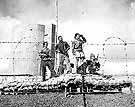
|
|
|

|

|

|

|
|
Click on an image to see a larger, more detailed picture.
|
|
|
|
|
| EPILOGUE: The Aftermath |

|
pg. 658 |

|
|
|
|
| |
 Menachem Begin was Israel's prime minister from 1977 to 1983. As a youth in 1930s Warsaw, he was an active Zionist, and traveled to Palestine with the Polish Army-in-exile in 1942. Begin was a leader of the militant Irgun group from 1943 until 1948.
Menachem Begin was Israel's prime minister from 1977 to 1983. As a youth in 1930s Warsaw, he was an active Zionist, and traveled to Palestine with the Polish Army-in-exile in 1942. Begin was a leader of the militant Irgun group from 1943 until 1948.
Photo: Ricardo Watson/Archive Photos
|
 Hagana youths, members of the Jewish underground, and their dogs guard a Jewish settlement in the Negev against a possible Arab attack in 1948.
Hagana youths, members of the Jewish underground, and their dogs guard a Jewish settlement in the Negev against a possible Arab attack in 1948.
Photo: Archive Photos
|
|
Jewish Underground in Palestine The Hagana (Defense Force) was founded in 1920 to fight off Arab attacks on Palestinian Jews. Accepting women as equals, Hagana members fought for the British during World War II. The Irgun (National Military Organization) was founded in 1931 by dissident Hagana members who felt the need to open up Palestine despite British opposition to help save European Jews. Throughout the Holocaust, the Irgun assisted the Aliya Bet, or "illegal" Jewish immigration, of European Jews into Palestine, as well as helping the British in anti-Nazi warfare. But once the war was nearly won, the Irgun began to attack British military targets in Palestine on the grounds that Britain's Jewish policy was overly restrictive, antisemitic, and in collaboration with the Germans. The aggressive Stern Group recognized that the British were generally anti-Jewish and pro-Arab and fought the British as well as the Germans.
|
|
This brief account of some 50 years of Palestine's history suggests a bit of the Jewish struggle for a homeland, and also prompts a serious question: Did the Jews in Palestine do as much as they could to thwart the Holocaust? Debate persists. Some arguments criticize the British for refusing to support Jewish-led military efforts. Others assert that the Jewish leadership in Palestine was too passive and compliant toward British policy. Whatever the truth--and it may be a combination of both positions--the inescapable fact is this: Antisemitic trends in Europe grew increasingly powerful throughout the 1930s, leading eventually to the systematic murder of six million Jews. Survivor reflection on that crime began to be widely published following the war. The Shock of Knowledge I've spoken with death and so I know the futility of things we learn a discovery I made at the cost of a suffering so intense I keep on wondering whether it was worth it. --Charlotte Delbo, Auschwitz and After
|
|

|

|

|

|
 July 3, 1947-April 10, 1948: Twenty-four senior SS and SD officers are tried at Nuremberg. Fourteen are sentenced to death.
July 3, 1947-April 10, 1948: Twenty-four senior SS and SD officers are tried at Nuremberg. Fourteen are sentenced to death.
|
 July 12, 1947: Jews in Nathanya, Palestine, beat and kidnap two members of a British Army intelligence unit, instigating temporary martial law by the British in the area.
July 12, 1947: Jews in Nathanya, Palestine, beat and kidnap two members of a British Army intelligence unit, instigating temporary martial law by the British in the area.
|
 July 18, 1947: Spandau Prison in West Berlin accepts the following Nazi war criminals sentenced to internment: Baldur von Schirach (See 1966), Karl Dönitz, Konstantin Freiherr von Neurath, Erich Raeder, Albert Speer (See 1966), Walther Funk, and Rudolf Hess (See August 17, 1987).
July 18, 1947: Spandau Prison in West Berlin accepts the following Nazi war criminals sentenced to internment: Baldur von Schirach (See 1966), Karl Dönitz, Konstantin Freiherr von Neurath, Erich Raeder, Albert Speer (See 1966), Walther Funk, and Rudolf Hess (See August 17, 1987).
|
 August 14, 1947: German Prince Josias Erbprinz von Waldeck-Pyrmont, the first member of the old German nobility to be recruited by the SS, is convicted of war crimes and sentenced to life imprisonment.
August 14, 1947: German Prince Josias Erbprinz von Waldeck-Pyrmont, the first member of the old German nobility to be recruited by the SS, is convicted of war crimes and sentenced to life imprisonment.
|
|
|
|
|
| EPILOGUE: The Aftermath |

|
pg. 658 |

|
|
The Holocaust Chronicle
© 2009 Publications International, Ltd.
|
|
